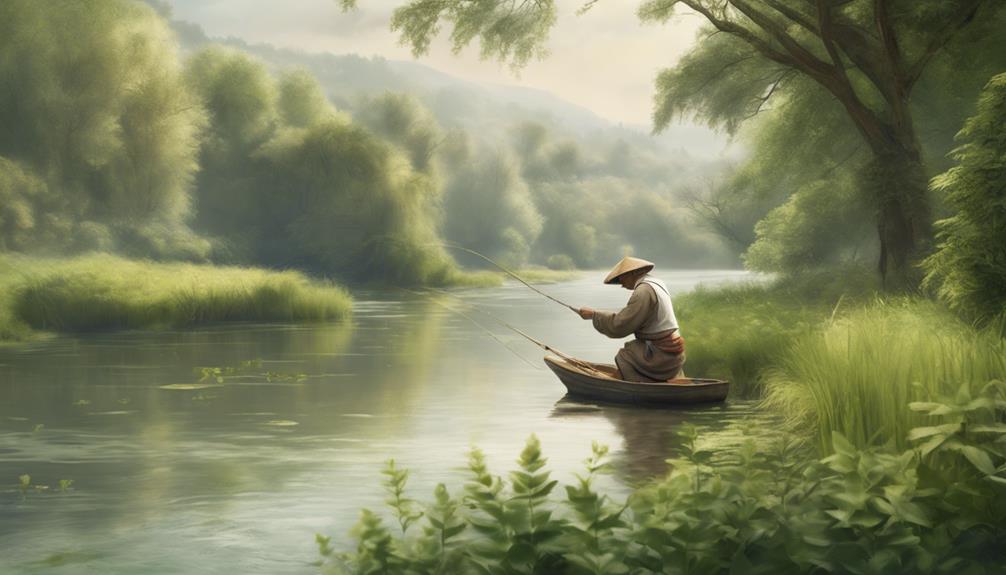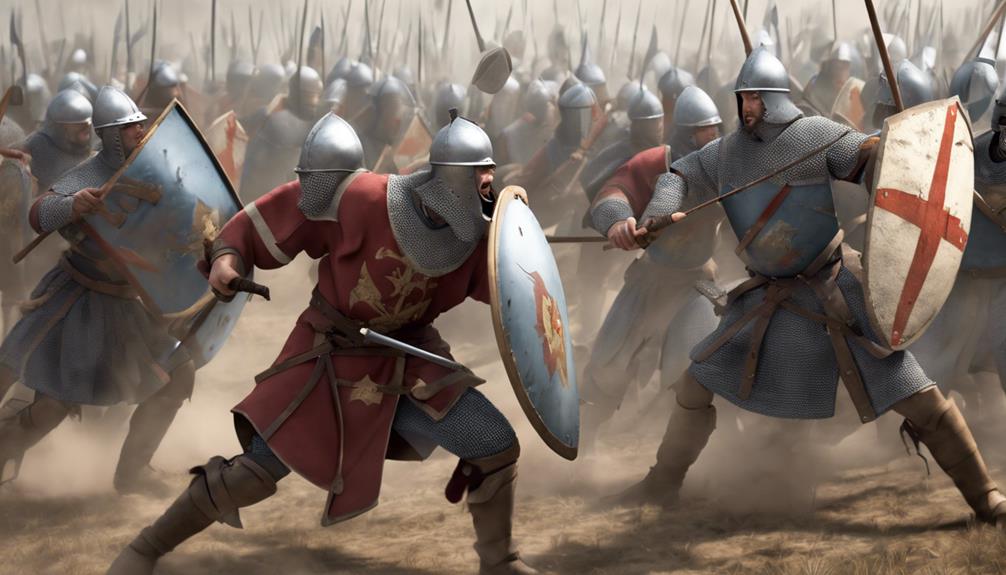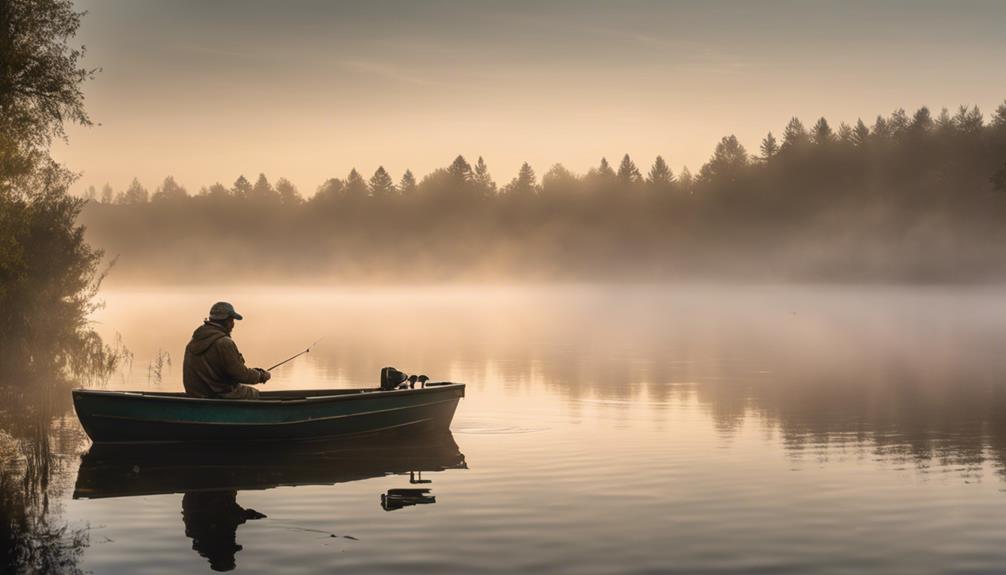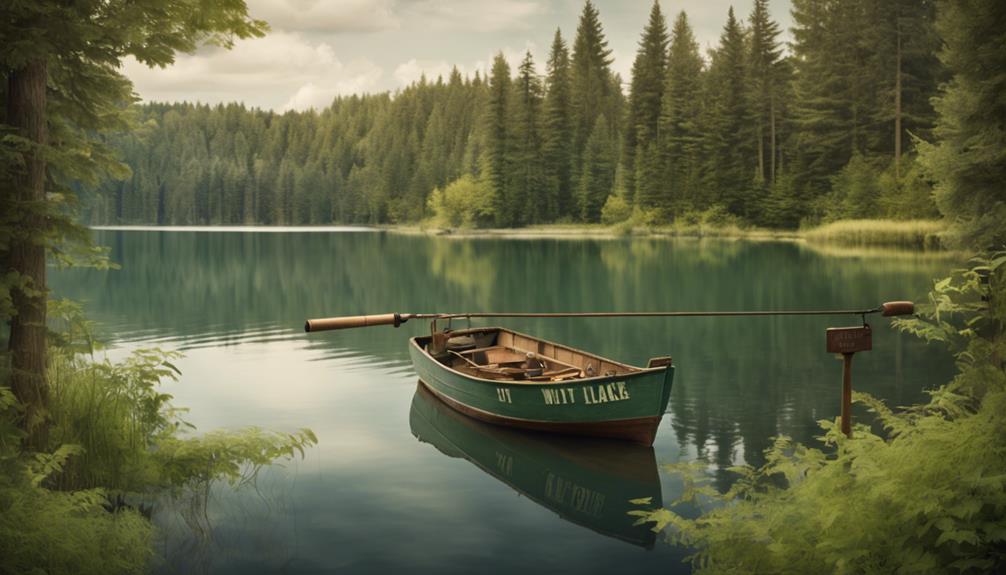In the vast European tapestry, angling emerges as a subtle thread weaving through the cultural fabric, symbolizing more than mere recreation.
Curious about why this ancient practice thrived in various European societies? The influence of religious beliefs, technological advancements, economic significance, and social structures all played crucial roles in shaping the significance of angling.
As you explore these interconnected factors, you will uncover a fascinating journey that goes beyond catching fish, revealing the intricate layers of history and tradition that continue to shape European angling practices today.
Early Angling Practices in Europe
When exploring the history of angling in Europe, early practices reveal a deep-rooted tradition of fishing for sustenance and leisure. Historical origins of angling in Europe can be traced back to ancient civilizations where fishing played a vital role in providing food for communities near rivers, lakes, and seas. As societies evolved, angling became not only a means of survival but also a cultural pastime, marking its significance in European traditions.
The evolution of techniques and equipment used in early angling practices showcases the ingenuity and resourcefulness of European fishermen throughout the centuries. From simple handcrafted rods and lines made of natural materials to more sophisticated gear like reels and hooks, the advancements in angling tools reflect the adaptability of European anglers to improve their craft. The cultural significance of angling is evident in the various rituals and ceremonies associated with fishing, highlighting its importance in folklore and traditions across different European regions.
As angling techniques became more refined, fishing became not just a way to catch fish but also a form of recreation and social bonding. The development of specialized baits, lures, and fishing methods tailored to different species of fish further demonstrates the depth of knowledge and expertise early European anglers possessed. Overall, the historical roots of angling in Europe lay the foundation for the rich tapestry of fishing practices and traditions that continue to thrive in modern times.
Influence of Religious Beliefs
Religious beliefs in European cultures significantly shaped the practice of angling, intertwining spiritual customs with the act of fishing. Throughout history, fishing wasn't merely a means of sustenance or leisure but held profound religious significance. In many European societies, fishing expeditions were accompanied by religious ceremonies to bless the waters and seek divine favor for a bountiful catch. These ceremonies often involved prayers, rituals, and offerings to appease water deities or spirits believed to govern the aquatic realm.
The spiritual connections to angling weren't limited to rituals before the fishing trip but extended to the act of fishing itself. Fish were often seen as sacred creatures in various religious beliefs, and catching them required reverence and respect. Fishermen were mindful of not only their techniques but also the spiritual implications of their actions, believing that a harmonious relationship with nature was essential for a successful catch.
Moreover, religious beliefs influenced the way fish were perceived in European cultures. Some societies considered certain fish species as symbols of divine qualities or associated them with religious stories and figures. This added another layer of significance to angling, turning it into a practice that transcended mere sustenance or recreation. The influence of religious beliefs on angling in European cultures highlights the deep-rooted connection between spirituality, nature, and human activities.
Technological Advancements in Angling
The evolution of angling in European cultures has been significantly influenced by technological advancements, revolutionizing the way fishing is practiced and enhancing the overall fishing experience. Innovative gear and fishing techniques have played a crucial role in shaping the way anglers interact with the water and its inhabitants.
One of the key technological advancements in angling is the development of innovative gear. From the invention of the fishing reel to the introduction of sonar technology, anglers have continuously benefited from tools that have made fishing more efficient and enjoyable. The use of advanced materials in fishing rods and lines has also enhanced durability and casting distance, allowing anglers to target fish in a more precise manner.
Moreover, advancements in fishing techniques have further improved the angling experience. Techniques like fly fishing and jigging have evolved over time, providing anglers with diverse ways to target different species of fish. The integration of technology, such as fish finders and underwater cameras, has allowed anglers to better understand fish behavior and habitats, increasing their chances of a successful catch.
Economic Importance of Fishing
The economic significance of fishing in European cultures can't be underestimated, as it plays a vital role in various industries and local economies. Fishing provides significant economic benefits to communities through the sale of fresh fish, supporting local businesses such as markets, restaurants, and equipment suppliers. In coastal regions, fishing contributes to tourism revenues, attracting visitors interested in experiencing traditional fishing practices and enjoying freshly caught seafood.
Moreover, fishing holds cultural significance in European societies, shaping traditions and identities. Many coastal towns and villages have deep-rooted fishing customs that have been passed down through generations, contributing to the unique cultural heritage of these regions. Fishing festivals and events celebrate this heritage, attracting both locals and tourists, further boosting economic activity in these areas.
The fishing industry also provides employment opportunities for many individuals, supporting livelihoods and sustaining coastal communities. Fishermen, fishmongers, and seafood processors all play essential roles in the fishing supply chain, generating income and fostering economic stability. Additionally, fishing practices often adhere to sustainable methods, ensuring the long-term viability of marine resources and promoting environmental conservation.
Role of Angling in Social Structures
Why does angling hold a significant place in shaping social structures within European communities? Angling plays a crucial role in fostering community bonding and strengthening social ties. In European cultures, fishing has been more than just a recreational activity; it has served as a means for people to come together, share experiences, and build relationships.
Participating in angling provides individuals with a common interest, creating opportunities for social interaction and connection. Whether it's a group of friends casting their lines in a local river or a family enjoying a day by the lake, angling brings people together in a shared pursuit. These shared experiences help in forging bonds and fostering a sense of belonging within the community.
Moreover, angling often involves traditions and rituals that are passed down through generations, further enhancing its role in social structures. Families or communities engaging in fishing together not only create lasting memories but also strengthen their cultural heritage.
Impact of Angling Literature
Exploring angling literature provides insights into the rich tapestry of stories and knowledge surrounding the art of fishing. As you delve into angling literature, you'll uncover a world of information that sheds light on the evolution of angling techniques and the cultural significance of fishing in European societies. Here are some key points to consider:
- Historical Evolution: Angling literature chronicles the historical evolution of angling techniques, from the earliest known methods to the sophisticated practices used in modern fishing. By exploring these historical accounts, you can gain a deeper appreciation for the skill and artistry that have developed over centuries.
- Cultural Significance: Angling literature also highlights the cultural significance of fishing in European societies. These stories and narratives provide valuable insights into how fishing has been intertwined with traditions, beliefs, and values, shaping the cultural identity of different communities.
- Environmental Impact: Some angling literature delves into the environmental impact of fishing practices, raising awareness about conservation efforts and sustainable angling practices. These discussions emphasize the importance of preserving natural habitats and biodiversity for future generations.
- Artistic Representations: Beyond practical knowledge, angling literature often includes artistic representations of fishing scenes in poetry, prose, and visual arts. These creative works capture the beauty and serenity of fishing, offering a different perspective on the art of angling.
Conservation Efforts in Angling
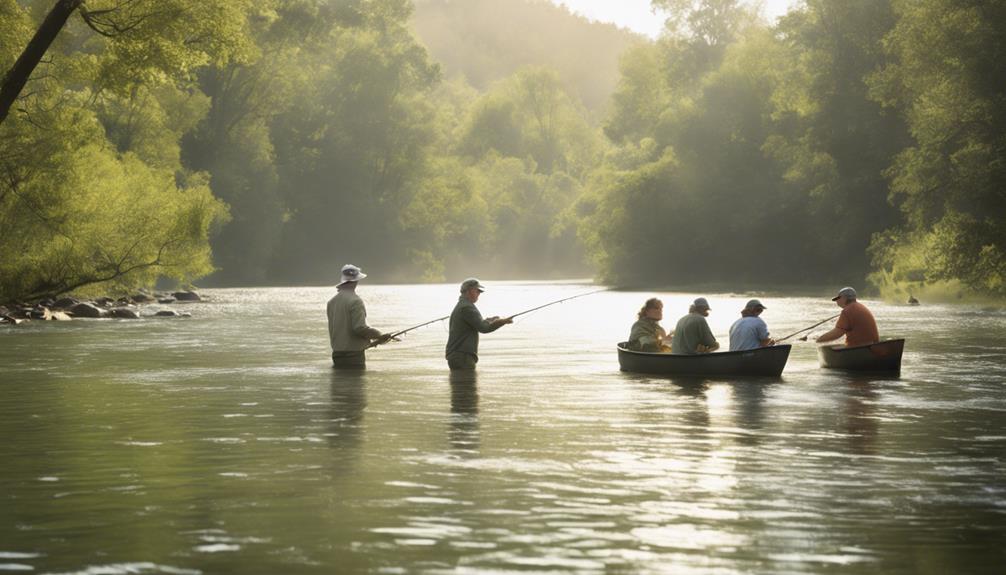
Amidst the pursuit of angling, active participation in conservation efforts plays a crucial role in preserving aquatic ecosystems. By adopting sustainable practices, anglers contribute significantly to the sustainability of fish populations. Sustainable angling involves techniques such as catch and release, selective harvesting, and using non-toxic tackle to minimize negative impacts on fish populations and their habitats.
Habitat restoration is another key aspect of conservation efforts in angling. Many angling communities engage in projects aimed at restoring degraded habitats, such as wetlands, rivers, and lakes, to ensure the long-term health and productivity of aquatic ecosystems. These restoration initiatives not only benefit fish populations but also enhance the overall biodiversity and ecological balance of the water bodies.
Catch limits are essential tools in managing fish populations and preventing overexploitation. Anglers play a vital role in adhering to catch limits set by regulatory authorities to maintain sustainable fish stocks. By respecting these limits and practicing responsible angling, enthusiasts help ensure that fish populations remain healthy and resilient for future generations to enjoy.
Modern Trends in European Angling
In modern European angling practices, technology and innovation have significantly influenced how anglers approach their fishing adventures. Anglers are embracing sustainability practices to ensure the longevity of their favorite pastime and protect the environment for future generations. Fishing tourism has also seen a rise, with anglers traveling to different European destinations to experience diverse fishing opportunities and environments.
- Sustainability Practices: Anglers are increasingly adopting catch-and-release techniques, using biodegradable fishing gear, and participating in clean-up efforts to promote sustainable fishing practices.
- Fishing Tourism: European countries are capitalizing on their natural resources, offering guided fishing tours, and creating angler-friendly accommodations to attract fishing enthusiasts from around the world.
- Angling Competitions: The popularity of angling competitions has grown, providing anglers with opportunities to showcase their skills, compete for prizes, and connect with like-minded individuals.
- Digital Tools: Anglers are utilizing cutting-edge technology such as fish finders, GPS navigation systems, and fishing apps to enhance their fishing experiences, increase their catch rates, and stay informed about weather conditions.
Frequently Asked Questions
What Is the Significance of Certain Superstitions or Taboos Associated With Angling in European Cultures?
When fishing in European cultures, certain superstitions and taboos hold great significance. These beliefs can range from avoiding specific actions or items while angling to performing rituals for a successful catch.
Superstitions surrounding fishing have been passed down through generations, shaping the way anglers approach the activity. In European cultures, these practices are deeply ingrained and can impact the overall experience and outcomes of fishing trips.
How Did the Social Status or Class of Individuals Affect Their Participation in Angling Throughout History?
Your social status has always influenced your participation in angling throughout history. Those of higher classes had easier access to exclusive fishing spots and better equipment, making angling a popular pastime among the elite.
Conversely, individuals of lower social standing often had limited opportunities for angling due to financial constraints. As a result, angling became intertwined with social hierarchies, shaping its popularity and accessibility across different classes throughout history.
Were There Any Specific Rituals or Ceremonies Related to Angling Practices in Certain European Societies?
In certain European societies, ritual practices and cultural ceremonies were deeply intertwined with angling. These traditions often symbolized reverence for the natural world and the bounties it provided.
Through these rituals, individuals honored the act of fishing, seeking blessings for plentiful catches and expressing gratitude for the sustenance it offered. Such ceremonies reinforced the importance of angling not just as a means of sustenance, but as a sacred connection to nature.
How Did the Changing Environmental Conditions or Natural Disasters Impact Angling Traditions in Europe?
As environmental changes occurred, traditional practices of angling in Europe faced challenges. Natural disasters disrupted fishing routines and habitats, impacting the availability of fish.
Despite these obstacles, anglers adapted their techniques and locations to continue their beloved pastime. The resilience of European anglers in the face of changing environmental conditions highlights the deep-rooted connection between angling traditions and the natural world.
Are There Any Notable Instances of Angling Being Used as a Form of Political or Diplomatic Tool in European History?
When it comes to political diplomacy and historical connections, angling has played a surprising role in European history. Leaders have used angling as a tool to foster relationships and negotiations.
For example, in the past, fishing trips have been arranged as a way to discuss important matters in a more relaxed setting. These instances highlight how angling transcends mere recreation and can be a valuable diplomatic strategy.
Conclusion
You have learned that angling flourished in European cultures due to a combination of factors:
- Early practices
- Religious influences
- Technological advancements
- Economic importance
- Social structures
- Literature impact
- Conservation efforts
- Modern trends
The rich history and tradition of angling continue to thrive, attracting enthusiasts from all walks of life. Whether for sport, relaxation, or tradition, angling remains a beloved pastime in European societies.
